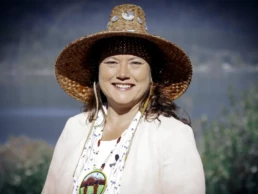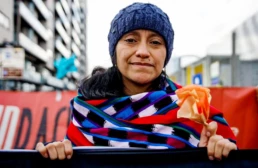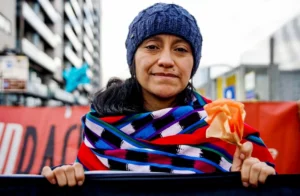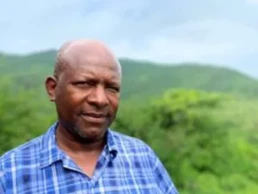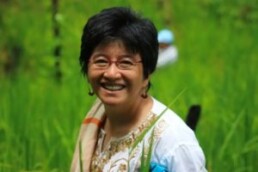Indigenous Leaders Spotlight: Meet Fawn Sharp

“Oftentimes, I think about my journey and my responsibility to the 3,000 people of the Quinault Nation...Holding public office means you have a sacred responsibility to honor the ones who spent their lifetimes and tremendous energy and resources to advance a nation."
- Fawn Sharp, Public Servant and Fierce Indigenous Rights Advocate
Fawn Sharp is one of four Indigenous Leaders selected to participate in the first cohort of The Christensen Fund’s Indigenous Leaders Program for her work in serving Indigenous communities as a public servant.
Born in Aberdeen, Washington, President Sharp is a citizen of the Quinault Indian Nation, a "climate refugee" Tribe that is urgently relocating its ancestral coastal villages upland due to catastrophic flooding caused by sea level rise.
President Sharp currently serves as the 23rd President of the National Congress of American Indians (NCAI), the oldest, largest and most representative American Indian and Alaska Native tribal government organization in the country. President Sharp is also the current Vice President of the Quinault Indian Nation in Taholah, Washington, after being a five-term past-President. As a former past-President, she fought for the Quinault Nation’s economic growth while upholding their traditions of civil rights activism, public advocacy, and environmental protection.
She has previously served as a human rights attorney and in several state appointments. In 2021, she became the first elected Tribal leader to officially represent the United States of America on the international stage at the 2021 United Nations Climate Change Conference (COP 26).
Her work positions her to advocate for policies that serve the interests of tribal governments and communities throughout the United States.
Indigenous Leaders Spotlight: Meet Andrea Ixchíu
“I would like us to start honoring the lives of people who are taking care of our land all while experiencing the effects of climate change and facing violence from governments [like Guatemala’s] and the extractive industries that are causing the climate crisis and perpetuating colonialist behaviors in our lands and territories.”
- Andrea Ixchíu, Storyteller for Human and Environmental Rights
Andrea Ixchíu is one of four global Indigenous Leaders selected to participate in the first cohort of The Christensen Fund’s Indigenous Leaders Program for her work as an environmental and human rights activist.
Andrea is an Indigenous Maya K’iche born in Totonicapán, Guatemala, where she is recognized as a land protector of Totonicapan’s ancestral forest and has also served as an Indigenous community government authority. Alongside ongoing digital attacks, she has survived physical attacks on her life in retaliation to her reporting of illegal loggers operating in the Totonicapán forest.
Andrea works as a filmmaker, journalist, and activist in collaboration with local and international media. In these roles, she has launched local campaigns and youth workshops to denounce gender violence against Indigenous women, starred in the 500 Years documentary, and earned a nomination to participate in the Nobel Women’s Initiative for her opinion column in the Guatemalan newspaper, El Periodico, as well as for her reporting for independent media in Latin America.
She is a coordinator at Hackeo Cultural, a community-based, global initiative that seeks to build and strengthen collective strategies, narratives, and technologies for defending Indigenous territories across Latin America. She also leads the Futuros Indígenas project, which aims to raise actions, not awareness, to face the climate emergency.
Her work continues to uplift Indigenous perspectives and leaders through the power of storytelling and radical activism.
Indigenous Leaders Spotlight: Meet Ole Kaunga Mali

“This is not only a victory for the El Molo, Turkana, Samburu, and Rendille communities that have been affected by the Lake Turkana Wind Project but one for all Kenyan communities that are facing serious threats of displacement and human rights abuses from large land-based investments.”
-Ole Kanuga Mali, Lobbyist and Champion for Indigenous rights, after land deeds for the Lake Turkana Wind Project were declared “irregular and unlawful”
Ole Kanuga Mali is one of four global Indigenous Leaders selected to participate in the first cohort of The Christensen Fund’s Indigenous Leaders Program for his proven track record of defending the rights of Indigenous Peoples locally and globally.
Ole is a Laikipia Maasai pastoralist from the northern region of Kenya. Ole’s primary focus includes protecting Indigenous land, lobbying, and advancing Indigenous rights.
Ole previously worked and consulted with the International Labour Organisation (ILO) as an Indigenous peoples’ expert for its Africa Program on Indigenous and Tribal Peoples. He also brought an international legal case against the British government for using Maasai and Samburu grazing lands in Kenya for military training and leaving live ordinances that maimed and killed scores of Maasai and Samburu. His other lobbying and advocacy efforts include protecting Indigenous people affected by megaprojects, such as the Lake Turkana Wind Power Project and the Isiolo Dam.
Currently, Ole serves as the founder and Director of IMPACT , a co-founder of Maasai Cultural Heritage, and an advisor for both Nia Tero and Conservation International. He also leads the PARAN Alliance, a movement that connects and promotes learning, agency, and voices among Indigenous People-led organizations in Kenya.
His fight to expand Indigenous movements and rights has and continues to have a significant positive impact on Indigenous communities globally.
Indigenous Leaders Spotlight: Meet Joan Carling

“Indigenous peoples are not the enemies. We are not against development. We are conserving our environment for the future of humanity. But we cannot do this alone. The global community, governments, companies and civil society must act in solidarity, and assume responsibility for realizing sustainable development for all.”
-Joan Carling, Environment and Indigenous Rights Defender
Joan Carling is one of four global Indigenous leaders selected to participate in the first cohort of The Christensen Fund’s Indigenous Leaders Program for her work as an Indigenous rights activist and environmental defender.
Born in the Philippines as a member of the Kankanaey Tribe, Joan has defended land and Indigenous rights for over 20 years, from grassroots to international levels. Her primary focus includes ensuring the sustainable development of natural resources, mitigating the climate crisis, and upholding the human rights of Indigenous Peoples.
Joan’s work has included active participation in the UN Framework Convention on Climate Change and REDD+, serving twice as Secretary-General of the Asia Indigenous Peoples Pact and as Chairperson of the Cordillera People’s Alliance. She was also appointed by the UN Economic and Social Council as an Indigenous expert and has been a member of the UN Permanent Forum on Indigenous Issues. In 2018, she received the Champions of the Earth Lifetime Achievement Award from the United Nations Environment Programme.
In February 2018, the Duerte regime labeled Joan a terrorist in her hometown of Cordillera, Philippines, for her work and activism to end “development projects” and mining that would harm the land and displace Indigenous people. She left her home after receiving this threat to her life and security.
Currently, Joan serves as the Global Director for Indigenous Peoples Rights International, an organization that works to end the criminalization of people defending Indigenous rights.
In her work, she continues to build alliances and strengthen networks while centering Indigenous voices and raising them in front of policymakers.
Planting Seeds for Reparations in California
California Native American families, communities, tribes, and organizations are encouraged to apply for funds before September 15, 2022.
The Christensen Fund is proud to join the Decolonizing Wealth Project and the California Endowment in establishing a new fund to support Indigenous Californians’ efforts to preserve tribal history and further California’s effort to atone for its history of violence and wrongdoing against Native Americans. The new California Truth and Healing Fund provides California Native American families, communities, tribes, and organizations with resources to engage in opportunities associated with the goals of the landmark California Truth & Healing Council. The deadline for the first round of proposals is June 29, 2022, and the deadline for the second round of proposals is September 15, 2022.
With an initial $500,000 investment from the Decolonizing Wealth Project, The California Endowment, and the Christensen Fund, the goal is to raise more than $5 million. The fund is guided by an advisory board of Native Californians, including Pechanga Band of Indians Tribal Chairman Mark Macarro and Truth & Healing Council-member Kouslaa Kessler-Mata (Yak Tityu Tityu Chumash). Announcement of the fund received widespread media coverage in May, including stories in CalMatters, KQED, ABC10, and outlets across the state.
The Project has partnered with The California Truth & Healing Council, which Gov. Gavin Newsom established in 2019 to “clarify the record – and provide their historical perspective – on the troubled relationship between tribes and the state.”
The Council on Truth & Healing is expected to release a report on the historical relationship between the state and California Native Americans by 2025. Our hope is that the report will include recommendations to the Legislature about reparations or restoration of land for Native communities.
The Christensen Fund’s participation in this fund exemplifies our commitment to partner with other funders in supporting Indigenous rights, self-determination, truth telling and healing. We are committed to mobilizing our peers in philanthropy to support this fund, in particular, and the rights, self-determination, and leadership of Indigenous Peoples in general.
For California Native American families, communities, tribes, and organizations interested in applying for funding, and funders interested in contributing to our $5 million goal, learn more here.
The Christensen Fund Announces First Cohort of Indigenous Leaders Program
As part of The Christensen Fund’s commitment to Indigenous communities, leaders and organizations, we are excited to announce our inaugural cohort of our Indigenous Leaders Program. The program celebrates four Indigenous leaders from Mexico, Kenya, the United States, and the Philippines who are advancing the inherent rights, dignity and self-determination of their communities, Nations and Peoples, and work to achieve the promise of the United Nations Declaration on the Rights of Indigenous Peoples (UNDRIP). The program provides 100,000 USD to each leader to advance their unique vision and work. These Indigenous leaders will also have access to the full range of The Christensen Fund's philanthropic efforts, including networks, covenings, and speaking engagements.
The Leaders Program was developed collaboratively with these Indigenous leaders in order to respect their prior commitments and demands on their time. In the spirit of self determination, these leaders will focus on issues or projects that they determine themselves.
We are honored to introduce and welcome our 2022-2023 Indigenous Leaders Program Participants:
Joan Carling (Philippines)
 Joan is an Indigenous activist from the Cordillera, Philippines with more than 20 years of working on indigenous issues from the grassroots to the international level. Her expertise includes areas like human rights, sustainable development, the environment, climate change, and additionally the application of Free, Prior and Informed Consent. She is currently the Global Director for Indigenous Peoples Rights International.
Joan is an Indigenous activist from the Cordillera, Philippines with more than 20 years of working on indigenous issues from the grassroots to the international level. Her expertise includes areas like human rights, sustainable development, the environment, climate change, and additionally the application of Free, Prior and Informed Consent. She is currently the Global Director for Indigenous Peoples Rights International.
Ole Kaunga Mali (Kenya)
 Malih Ole Kaunga is a Laikipia Maasai – a practicing pastoralist (keep Goats and Sheep) and a father of three daughters and two sons. Ole Kaunga has a proven track record of defending the rights of Indigenous Peoples locally and globally. He is the founder and Director of IMPACT and a co- founder of Maasai Cultural Heritage. He leads the PARAN Alliance, a movement that connects and promotes learning, agency and voices among indigenous peoples led organizations in Kenya.
Malih Ole Kaunga is a Laikipia Maasai – a practicing pastoralist (keep Goats and Sheep) and a father of three daughters and two sons. Ole Kaunga has a proven track record of defending the rights of Indigenous Peoples locally and globally. He is the founder and Director of IMPACT and a co- founder of Maasai Cultural Heritage. He leads the PARAN Alliance, a movement that connects and promotes learning, agency and voices among indigenous peoples led organizations in Kenya.
Andrea Ixchíu (Mexico-Guatemala)
 Andrea is an Indigenous Maya K’iche environmental and human rights activist, born in Totonicapán, Guatemala. She is a recognized land protector of Totonicapan’s ancestral forest where she has also served as an Indigenous community government authority. She works as a journalist, filmmaker and radialist, and collaborates with local and international media. Andrea is coordinator at Hackeo Cultural, a community-based with global reach initiative that seeks to build and strengthen collective strategies, narratives and technologies for the defense of Indigenous territories across Latin America. She also leads the Futuros Indígenas project that seeks to raise not awareness but actions, aimed to face the climate emergency.
Andrea is an Indigenous Maya K’iche environmental and human rights activist, born in Totonicapán, Guatemala. She is a recognized land protector of Totonicapan’s ancestral forest where she has also served as an Indigenous community government authority. She works as a journalist, filmmaker and radialist, and collaborates with local and international media. Andrea is coordinator at Hackeo Cultural, a community-based with global reach initiative that seeks to build and strengthen collective strategies, narratives and technologies for the defense of Indigenous territories across Latin America. She also leads the Futuros Indígenas project that seeks to raise not awareness but actions, aimed to face the climate emergency.
Fawn Sharp (United States)
 Fawn Sharp serves as the 23rd President of the National Congress of American Indians (NCAI), the oldest, largest and most representative American Indian and Alaska Native tribal government organization in the country. President Sharp is also the current Vice President of the Quinault Indian Nation in Taholah, Washington, after being a five-term past-President. Ms. Sharp has held numerous leadership positions, including a number of state appointments.
Fawn Sharp serves as the 23rd President of the National Congress of American Indians (NCAI), the oldest, largest and most representative American Indian and Alaska Native tribal government organization in the country. President Sharp is also the current Vice President of the Quinault Indian Nation in Taholah, Washington, after being a five-term past-President. Ms. Sharp has held numerous leadership positions, including a number of state appointments.
The Christensen Fund joins governments and private funders to announce historic $1.7 billion pledge at COP26 in support of Indigenous Peoples and Local Communities
UK, Norway, Germany, US, and the Netherlands, and 17 funders pledged to support Indigenous Peoples, local communities at COP26, citing their proven role in preventing deforestation that fuels climate change
In raising the visibility of Indigenous Peoples at the World Leaders Summit, donors also committed to delivering funding directly to communities and promised them a role in ‘decision-making and design’ of climate programs and finance instruments
GLASGOW (2 November 2021)–The UK, Norway, Germany, the US, and the Netherlands, in partnership with The Christensen Fund and 16 other funders, pledged today to invest US$1.7 billion to help Indigenous and local communities protect the biodiverse tropical forests that are vital to protecting the planet from climate change, biodiversity loss, and pandemic risk, according to an announcement made today at a high-level World Leaders Summit at COP26.
“We are demonstrating our commitment today by announcing an initial collective contribution of at least $1.7 billion of confirmed financing to support the advancement of Indigenous Peoples’ and Local Communities’ forest tenure rights and their role as stewards of forests and nature,” says a statement released today by the donors. “We intend to build on this in subsequent years, increasing funding as ambitious programmes and proposals come forward. We also call on other donors to significantly increase their support to this important agenda.”
Indigenous Peoples and local communities manage half the world’s land and care for an astonishing 80% of Earth’s biodiversity, primarily under customary tenure arrangements. A recent study showed, however, that Indigenous communities and organizations receive less than 1% of the climate funding meant to reduce deforestation.
“Climate justice is only possible with full support of the rights of Indigenous Peoples,” said The Christensen Fund CEO Carla Fredericks. “Across the globe, and especially in the forests and other sensitive natural habitats that are key to averting absolute climate collapse, Indigenous Peoples hold millennia’s worth of wisdom and connection to natural environments, which can, and already has proven to, mitigate climate change and restore biodiversity. The Christensen Fund joins this pledge in recognition of the importance of the rights and self determination of Indigenous Peoples in climate finance commitments.”
“This pledge signals our commitment to protecting the world’s tropical forests and those who live in them,” said Lord Goldsmith, Minister of State for Pacific and the Environment. “The evidence is overwhelming that Indigenous Peoples and local communities are forests’ most effective guardians, often in the face of acute danger, and so they should be at the heart of nature-based solutions to the climate emergency. By investing in tropical forest communities and expanding their communal rights, we will also tackle poverty, pollution, and pandemics.”
Among the philanthropic groups joining the new pledge at a critical moment for addressing the climate crisis are the Ford Foundation, Children's Investment Fund Foundation, the Christensen Fund, David and Lucile Packard Foundation, Sobrato Philanthropies, Good Energies Foundation, Oak Foundation, William and Flora Hewlett Foundation, and, as part of the Protecting our Planet Challenge members, Arcadia, Bezos Earth Fund, Bloomberg Philanthropies, Gordon and Betty Moore Foundation, Nia Tero, Rainforest Trust, Re:wild, Rob and Melani Walton Foundation and the Wyss Foundation.
For years, only about $270 million of climate finance has been dedicated to forest protection each year, yet the Indigenous Peoples and local communities that protect the world’s forests directly receive only $46 million. With today’s announcement, the governments and funders hope to take a first step toward correcting an unjust system that has failed to favor communities that have the knowledge and capacity to outperform most other forest managers.
Researchers suggest that forests can contribute as much as 37% toward climate mitigation goals that governments committed to in the 2015 Paris Agreement. Protecting forests, which harbour precious biodiversity, also helps to prevent encounters with wildlife that can encourage the spillover of potentially dangerous pathogens into human populations.
A growing body of evidence shows that Indigenous Peoples are the most effective guardians of biodiverse tropical forests, which are increasingly under siege; UN experts recently urged climate negotiators at COP26 to respond with urgency to the destruction of precious ecosystems.
And yet the evidence, including a new study released in October, suggests the urgent need to scale up solutions to combat the destruction of tropical forests. In a comprehensive analysis of progress on a global commitment to protect forests, the authors called for recognizing and securing the rights of Indigenous Peoples and local communities and for making the communities “central to setting goals and priorities for forest activities.”
“There is no viable solution to the climate crisis without forest and land management by Indigenous Peoples and local communities who have proven that they are the best guardians of the world’s forests,” said Darren Walker, president of the Ford Foundation. “This historic $1.7 billion pledge is a challenge to all funders to do far more to support and partner with Indigenous Peoples and local communities who hold a key solution to climate change, and have them lead the way.”
In a statement signed by philanthropic and government leaders and released today, the funders promised “to further recognise and advance the forest and nature stewardship role of Indigenous Peoples and local communities, in partnership with governments and other stakeholders, with a particular focus on strengthening land tenure systems and protecting the tenure and resource rights of Indigenous Peoples and local communities.”
The statement goes on to commit the signatories “to prioritise the inclusion of Indigenous Peoples and local communities in decision-making and in the design and implementation of relevant programmes and finance instruments, recognising the interests of vulnerable and marginalised groups including women and girls, people with disabilities, and youth.”
In his presentation at the World Leaders Summit today, Tuntiak Katan, a Shuar from Ecuador and an Indigenous leader representing the Global Alliance of Territorial Communities, cited data showing that 12.2 million hectares of forest were destroyed in 2020. Katan welcomed the unprecedented commitment by donors to support and partner with Indigenous and local communities on the front lines of the climate crisis and called it a major step forward in advancing the goals of the Paris climate agreement. But he noted the new commitments for protecting tropical forests and their guardians will require significant political will on the part of governments and the support of the global economic and political sectors.
“We hold the best carbon capture technology our planet has to offer—our forests,” said Katan, whose alliance brings together elected leaders from the world’s largest tracts of forests in Indonesia, Africa, and Latin America and represents 35 million forest communities. “The work to protect the planet’s future will only be successful in partnership with Indigenous Peoples and local communities. We want to work with you to transform this world and to change people’s hearts. We are the solution you are looking for.”
The Christensen Fund to Welcome Two New Directors for Global and U.S. Strategies
Casey Box and Shawn Watts to join Christensen as it implements its Indigenous Rights strategy
The Christensen Fund is pleased to announce Casey Box and Shawn Watts as its newest team members to lead its global and U.S. grantmaking portfolios. “I am thrilled to welcome Casey and Shawn to The Christensen Fund team,” said Carla Fredericks, Chief Executive Officer of The Christensen Fund. “These two leaders will make it possible for us to advance our strategy to support Indigenous Peoples' inherent rights and self determination across the communities we partner with in the U.S. and globally. We are excited and honored to add their experiences and expertise to our team.”
Casey Box will join the organization as Director of Global Strategy on October 18, 2021. Casey brings considerable experience leading philanthropic causes to preserve and advance the rights of Indigenous Peoples around the world. For eight years, Casey served as the Executive Director for Land is Life, where he built an inspiring and enduring legacy focused on the advancement of Indigenous Peoples’ rights. He has worked to address issues, including the security of Indigenous peoples and their lands and territories; free, prior and informed consent; and protecting peoples living in voluntary isolation and initial contact. In this new role with The Christensen Fund, Casey will focus on supporting international organizations, leaders and movements in recognizing the inherent rights of Indigenous Peoples.
Shawn Watts will join as Director of U.S. Strategy on January 5, 2022. Shawn’s career has focused on Native American law. He joins The Christensen Fund after having most recently served as Director of the Tribal Law & Government Center, Tribal Judicial Support Clinic and Mediation Clinic at Kansas University. Prior to KU Law, Shawn taught at Columbia Law School in New York City where he was the Associate Director of the Mediation Program and also taught an Advanced Mediation Clinic and a Native American Peacemaking Clinic. A citizen of the Cherokee Nation of Oklahoma, Shawn is also a district court judge for the Prairie Band Potawatomi Nation.
Caring for our Partners and Communities
Dear Partners and Friends,
We know that COVID-19 is at the center of everyone’s mind. At Christensen, we have been closely following global developments, listening deeply to emerging recommendations from authorities and strategizing together on how best to support and care for our team, our families and communities, and you, our colleagues and partners. We want you to know that everyone’s health and safety is our top concern. We recognize that each of you holds many essential roles and that collectively caring for ourselves is caring for our communities and our movements.
We know that the rapidly changing environment may impact grant activities including travel, conferences, gatherings and other dimensions of work. We are here to be flexible and to work collaboratively with you. If you anticipate major impacts or changes to planned activities or outcomes, please contact your Program Team lead. We are ready to think together on strategies forward.
We don’t anticipate any impact on grant payments or responsiveness. We have plans in place to make sure our core business isn’t interrupted.
Our physical participation in events over the next few months will be limited. Internally, we are giving our team flexibility to work remotely, and our San Francisco office is closed until April 7 as part of a city-wide ordinance. We are cancelling all travel through April. We look forward to continuing to connect with you but for the time being, all meetings will be virtual.
Please be in contact should you have any questions or concerns.
Wishing safety and good health to you and your families.
In Solidarity,
The Christensen Fund
Cuidando a nuestros socios y nuestras comunidades
Estimadas y estimados compañeros,
Sabemos que COVID-19 está en el centro de la mente de todas y todos. En El Fondo Christensen, hemos estado siguiendo de cerca el desarrollo global de los acontecimientos, escuchando profundamente las recomendaciones emergentes y elaborando estrategias conjuntas sobre la mejor manera de apoyar y cuidar a nuestro equipo, a nuestras familias y comunidades, y a ustedes, nuestros colegas. Queremos que sepan que la salud y la seguridad de toda/os es nuestra principal preocupación. Reconocemos que cada una/o de ustedes tiene muchos roles esenciales y que cuidarnos colectivamente es cuidar a nuestras comunidades y a nuestros movimientos.
Sabemos que el entorno rápidamente cambiante puede afectar las actividades de subvención, incluidos viajes, conferencias, reuniones y otras dimensiones de su trabajo. Estamos aquí para ser flexibles y trabajar en colaboración con ustedes. Si anticipa grandes impactos o cambios en las actividades o resultados planificados, comuníquese con su contacto del programa. Estamos listos para pensar juntos en las estrategias a seguir.
No anticipamos ningún impacto en los pagos de subvenciones o la capacidad de respuesta. Tenemos planes establecidos para asegurarnos de que nuestra actividad principal no se interrumpa.
Nuestra participación física en eventos durante los próximos meses será limitada. Internamente, estamos dando flexibilidad a nuestro equipo para trabajar de forma remota y nuestra oficina de San Francisco está cerrada hasta el 7 de abril como parte de una ordenanza oficial de toda la ciudad. Estamos limitando todos los viajes hasta abril. Esperamos seguir conectando con usted, pero por el momento, las reuniones serán virtuales.
Póngase en contacto si tiene alguna otra pregunta o inquietud.
Deseando seguridad y buena salud para usted y sus familias.
En solidaridad,
El Fundo Christensen


